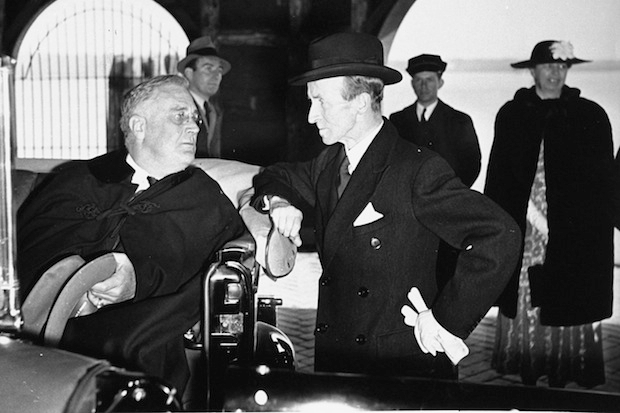When John Buchan was appointed Governor General of Canada in 1935, the country was deep in depression, the western provinces a dustbowl and a quarter of a million people on public relief, while the prospect of war in Europe threatened great stresses in a newly independent country and its relations with Britain. Many or even most Canadians wanted one of their own and a commoner. They were given a Scot and a Lord Tweedsmuir.
In his four and a half years as Governor-General, Buchan/Tweedsmuir had to take care. Canadians, from Prime Minister Mackenzie King downwards, were alert to any sign the self-governing cominion was being put back ‘into any colonial status’. King, a fellow Scot who dreamed of sitting with Buchan at Rideau Hall in Ottawa and arranging the affairs of church and state, found his hero was ‘a Tory [with] a sort of royalty complex’ (King liked to be known as ‘Rex’ and was not immune to the second of those failings.)
Buchan’s friend, US President Franklin D. Roosevelt in Washington, beset by a clamour for neutrality in old-world quarrels, could not openly consort with such a notorious imperialist. From across the water, Buckingham Palace disliked Buchan’s journalism; and as the King’s representative acting as ‘a publicity agent for boosting a particular dominion’, Buchan also had to discipline his romanticism. This was best seen in his plan to establish a secret society of 11 men from the pinnacles of Wall Street, journalism, business and politics to further British interests in the US or to slip down, incognito, to Hyde Park to plot with FDR. Above all, Buchan had to fight his own mortality.
On a diet of morphine and steamed fish, he crisscrossed the continent. His journey by steamer down the Mackenzie River to the Arctic Sea in 1937 gave him his last novel, Sick Heart River (1940), but probably did for him. He loved Canada as a sort of Scotland on a colossal scale and became more Canadian than the Canadians. Like many of his generation, he was out of his depth with Hitler, and did not despair of peace until the turn of 1939. Canada recalled parliament before asking the King to declare war on Germany on 10 September 1939, a week after the United Kingdom. Buchan shipped off two sons to the Canadian Militia. On 6 February 1940, he fell in the bathroom at Rideau Hall, and died five days later.
Such a story, with its minute focus on a single Scot in Canada and its parade of plumes and prairies, might expect a readership in this country of one, who is more than satisfied. Yet for all those interested in the past, Galbraith’s book casts a clear sidelight on the international politics of the 1930s and on the British empire before its last, and mortal, fight.
James Buchan is a grandson of John Buchan.





Comments